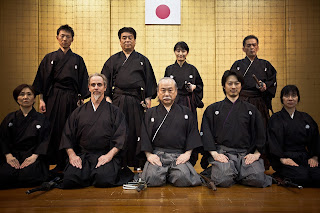 |
| Good Ink, Fukuoka. |
Dear Diary,
I recently returned back from Japan.
I performed 453 shows in four cities there. Our 3000 seat big
top was usually full.
I joined and trained in Iaido in four separate dojos.
I was there for the earthquake.
And the cherry blossoms. (twice.)
I got lost. (a lot.)
It was Myō.
A hundred years ago people wrote diaries. Your diary was your
Facebook, your private audience, yourself. I suppose blogs and such serve that
function now. This is how we label and describe our experience. I was looking
for a way to describe the experience of spending a year and a half in Japan and
I stumbled across the perfect word:
This word has two meanings.
It means indescribably beautiful.
It also means strange.
Myō.
This word is doing the splits.
This is a Buster Keaton word; one foot on dry land, the other on
the deck of the good ship Damfino as it bobs further and further from the
shore.
And it is this duality that makes this word the perfect
description of my experience in Japan.

Words can do a disservice to the actual. Our need to describe beautiful things can rob them of their beauty.
Why can't we just shut up and
let their silence do the talking?
So the Japanese invented a word that describes the indescribable.
But this word is like a coin.
Another meaning lurks like a doppelganger on the
flip side of this coin.
And that meaning is simply this:
Strange.
Strange.
Uttering the Unutterable
 | ||
| Sad Cookie Box. |
I won't do my experience the disservice of description.
I won't try to label the appreciation I have for the placement
of the delicately balanced foot paths I found on mountain trails.
I won't endeavor to put into words the tenderness I felt for a trio of monks as they quietly swept spent ginkgo leaves into a pile at some Kyoto temple.
I won't sully with syllables the rush of the marvelous that I felt seeing how a single well placed chopstick can take a cascade of hair spilling across a porcelain shoulder and turn it into an exquisite black whirlpool that rests atop a head like a finely woven nest.
Suffice it to say it is indescribably beautiful.
Yet with that
there is a strangeness.
Suffice it to say it is Myō.
Shades of Shinjuku
 |
| Bloom Shelter |
Is it not strange that on the last train on a Friday night on the Yamanote line a man can drunkenly stagger into a crowded train, vomit, step back onto the platform before the doors can close forcing the crush of humanity to be forced to stand on the fresh spew in that impossibly confined space for as many stops as it takes to get them to their destination and nobody says anything.
 |
| Busiest Intersection on Earth. |
Is it not strange that during the cold season sometimes 30% of our audience were wearing surgical masks.
(Whether they wear them to protect themselves from others or to
protect others from themselves I was never able to ascertain.)
 |
| Beware of Kappa. |
 |
| A flower amongst the ruins. |
And the reason nobody bumps is that Japanese culture comes replete with a fundamental sense of Ma.
MA 間
 |
| Meoto Iwa. |
Ma is something beyond a word.
It is a concept.
A thread woven
through the fabric of existence.
And another word that straddles two meanings.
Ma is distance but it is also interval.
It is therefore time as well as space.
Ma is the emptiness between things.
It is the stillness that lives at the end and the beginning of
all movement.
In music Ma is the space between the notes.
In art it is the areas in which there is no art so that the art
may more readily be seen.
 |
| When Robert Rauchenberg erased a de Kooning he was playing with Ma. |
In martial arts it is space between the opponents but also the
time necessary to attack or defend.
Because Ma is both time and space concurrently it can be charged
with possibility.
Ma is more than negative space.
Ma is alive.
Shiokawa Sensei and the Hakata Iai Study Group.
In Iaido you can see Ma at work quite clearly.
You can see it in the transitions, where the residue of what
came before gets a chance to ebb and the fuse of what is to come gets lit.
Maeda Sensei and godan Greg Robinson, Nagoya.
Iaidoka try to distinguish this space with a charged/not charged
quality.
This all inclusive awareness that does not pick out any one
thing in particular but rather endeavors to see all calmly is called Zanshin.
Keeping zanshin while executing a waza or form in iaido is one of those scratch
your head rub your belly conundrums that never gets old because it never gets
easy.
Practicing Zenteki Gyakuto at Shiokawa Dojo.
Zanshin is elusive.
If you don't have it you're dead.
If you try too hard to get it you're dead.
But the combination of good zanshin and an innate sense of
proper Ma can be deadly.
In any duel (on or off the "battlefield") it is the
one who controls the Ma who is invariably the victor.
Ma is also a deeply personal thing.
How you manage Ma is as distinct to you as a fingerprint, as
revealing as an x-ray and perhaps the only place in the highly codified
practice of iaido where personal style can be subtly revealed.
Ma can be very real.
And Ma can disappear.
When a memory of stepping into a warm spring fed Onsen is as
vivid as if it is happening right now that is the Ma of time collapsing.
And the very real six thousand miles between Tokyo and San
Francisco is the Ma of distance rearing its ugly head.
Dear Diary,
I miss Japan.
It was really Myō.
 |
| Mixed messages in Miyajima. |










1 comment:
described imperfectly, with many empty spaces and gaps..
so i see
jordan
Post a Comment